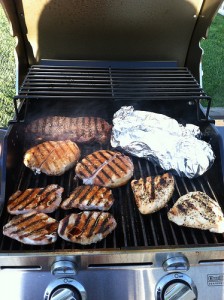Kids out of school, going to the beach, barbequing in our back yards, these are just a few signs that summer is really here! And with that comes some extremely hot days, especially here in Florida.
As you welcome summer, we want to remind you that safe grilling practices are the key to making your cookout a big hit with your family and guests.
Foodborne illness, often called “food poisoning”, comes from food you eat. It’s caused by ingesting pathogenic bacteria. You can’t see, smell, or taste these pathogens. What’s more, they cause a variety of foodborne illnesses and can make you really sick.
E. coli 0157:H7 and Salmonella are examples of two pathogens that are commonly associated with foodborne illness. E. coli 0157:H7 is commonly associated with ground beef and Salmonella with poultry but they are not limited to these two foods.
To reduce your chances of a foodborne illness when grilling out, keep your surfaces and equipment clean. Keep hands clean by washing them with soap and warm water for 20 seconds before and after handling food.
Keep food in the refrigerator until ready to use. Your refrigerator temperature should be 40°F or colder. These temperatures slows the growth of bacteria.
Always keep raw meats and poultry separate from cooked foods and foods to be eaten raw such as fruits and vegetables. Juices from raw meats can contaminate these foods. When grilling meat and poultry, they tend to cook very fast and may look done on the outside. Always use a thermometer to be sure the food has reached a safe, minimum, internal temperature. Insert the thermometer in the thickest part of the food away from the bone and fat toward the end of the cooking process.
If cooking ground beef, cook patties to a temperature of 160°F. Do not rely on color to test for doneness. Use a thermometer! Cook steaks to a temperature of 145°F to 170°F. The temperature for steaks depends on whether you want it medium rare, medium or well done. Ground beef is cooked to a higher temperature because bacteria that may have been on the outside of the meat is now mixed throughout the meat. All poultry must be cooked to an internal temperature of 165°F. Once meat or poultry are cooked, never put it on the same dish that your raw meat was on unless the dish has been washed with soap and water.
Always marinade foods in the refrigerator. Never use marinade or sauce that has come in contact with the raw product. Brush or sprinkle sauces or spices on the surface of cooked burgers. Adding them to the meat may make it look brown before it is done.
Do not keep grilled food out longer than two hours or one hour if the temperature is above 90°F! Avoid the “danger zone” — keep food hot after cooking (140°F or above) and cold food cold (40°F or less).
If you would like to contact Dr. Moore for more information, you can reach her at the UF/IFAS Bay Extension Office at 784-6105.
 0
0
